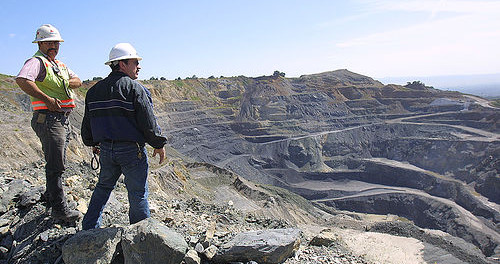Quarry valuation domain name complaint denied
The following is a summary of Stephens Valuation and Consultancy Pty Ltd v. SLR Consulting Australia Pty Ltd Case No. DAU2013-0026 at the WIPO Arbitration and Mediation Center.
A quarry valuation company has failed to prove the domain names registered by a competing firm were registered in bad faith.
Stephens Valuation and Consultancy Pty Ltd, registrant of ‘www.quarryvaluations.com’, had argued SLR Consulting Australia Pty Ltd had registered identical and confusingly similar domain names ‘quarryvaluation.com.au’ and ‘quarryvaluations.com.au’, to confuse users and direct traffic to parent site ‘www.slrconsultingaustralia.com.au’ for financial gain.
However, after all evidence was considered, the panel dismissed the case.
The Players
Complainant: Mr. Stephens, of Stephens Valuation and Consultancy Pty Ltd.
Respondent: Mr. Herdman, of SLR Consulting Australia Pty Ltd
Situation
Both companies provide quarry asset valuations, along with other services.
Stephens registered www.quarryvaluations.com in April 2008. Stephens also has a site called www.quarrysalesaustralia.com which sells quarries and directs users to www.quarryvaluations.com
Herdman had quarryvaluation.com.au and quarryvaluations.com.au created in April 2011. They directed traffic to Herdman’s primary site, slrconsultingaustralia.com.au.
After quarryvaluation.com.au and quarryvaluations.com.au came into existence, Stephens registered the trademark for www.quarryvaluations.com on Onctober 29, 2011.
Stephens’ Claims:
- Stephens had trademark rights in www.quarryvaluations.com.
- The name already had an existing business reputation (that was being impeded by Herdman).
- Herdman had no rights or interest in the two domain names other than to divert traffic to his main site www.slrconsultingaustralia.com.au.
- Herdman knew of the quarryvaluations.com address as he visited it a number of times, and in March 2011 was banned from visiting it.
- In October 2012, Stephens’ party sent a cease and desist letter to Herdman, which was mostly ignored, other than to stop diverting traffic to slrconsultingaustralia.com.au.
- Stephens claimed the site was distinctive of his brand name. Herdman’s business was not known by those names, and only established them to confuse users with the trademark and divert them to his site for financial gain- in bad faith.
Herdman’s Response:
- Herdman claimed Stephen’s trademark rights were too limited to support the complaint and protect the domain name.
- Stephens did not operate the site as a trademark.
- The ‘quarryvaluation’ name cannot be considered identical, confusingly similar or even distictive to Stephen’s business, as they are words descriptive of quarry evaluation services.
- Stephens’ rights do not extend to prevent others from registering the disputed sites, nor does their descriptive nature allow him to hold a monopoly over the terms.
- Herdman was unaware of Stephens’ supposed established reputation, claiming no such reputation existed to impede upon.
- Stephens registered the tradmeark only after Herdman registered the disputed domain names, therefore denying common law rights.
- Herdman claimed the registration of the disputed domain names was based purely on their descriptive significance (used to direct to principal site), and not their association with Stephens’ business.
Panel Findings:
- Herdman was the beneficial owner and registrant of the disputed domain names since April 2011.
- Stephens had sufficiently established www.quarryvaluations.com as a registered trademark.
- However, he was not operating the domain name as a mark or identifier of its services in a trademark sense.
- Both disputed domain names were in fact identical or confusingly similar to Stephens’ site, regardless of the alleged ‘descriptiveness’ of the terms.
- However, under Australian ‘.com.au’ domain naming policies, a person is still allowed to register a domain name with words “otherwise closely and substantially connected to” them.
- Much of the argument still relied on interpretations of the descriptive nature of the terms “quarry valuation” when registering the domains.
- It was difficult for Stephens to prove Herdman lacked rights or interest in the disputed domain names, as they still related to his business operations.
- It was confirmed that at the time the disputed domain names were registered by Herdman in April 2011, Stephens had not yet registered a trademark for ‘quarryvaluations.’
Final Ruling:
The Panel determined that Herdman registered the disputed domain names (despite using the disputed domain names to direct traffic to his main website) because, at least in part, they related to his business.
They could not conclusively determine that the words “quarry valuation” were inherently unique or distinctive, and, as Herdman worked in the same field as Stephens, had the right under Australian ‘com.au’ domain naming policies to register the disputed websites.
The Panel also concluded that Stephens failed to prove beyond doubt that Herdman had registered the domain names in bad faith.
The final ruling was that the complaint was denied.
The Panel also turned down Herdman’s claim of Reverse Domain Name Hijacking by Stephens.
It was also revealed during the case that previous personal animosities had existed between the two parties.
To note, both disputed domains ‘quarryvaluation.com.au’ and ‘quarryvaluations.com.au’ were down and unresponsive at the time of writing.
This article is sponsored by Discount Domain Name Services, Cheaper Domains , and Information Brokers .
